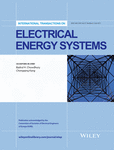Optimal scheduling of the plug-in electric vehicles aggregator energy and regulation services based on grid to vehicle
Summary
The advantage of grid-to-vehicle power over vehicle to grid is that the existing power grid infrastructure and technology are able to support its operation. In this paper, a regulation operation framework for grid-to-vehicle–based plug-in electric vehicle (PEV) aggregator is proposed. Based on that, PEVs can provide regulation services during charging. The objective function consider the influence of regulation services on the energy of battery charging for PEVs and the constraint of systems for battery charging power of PEVs, achieving the maximum aggregator earnings. A regulation algorithm is proposed for the aggregator to schedule PEVs. The algorithm considers the constraint of PEVs battery capacity and reduces the communication traffic between the aggregator and the PEVs. Simulation results indicate that the optimal scheduling can not only increase the earnings of the aggregator but also reduce the charging cost of PEV owners on the basis of meeting the charging requirements of PEVs.




